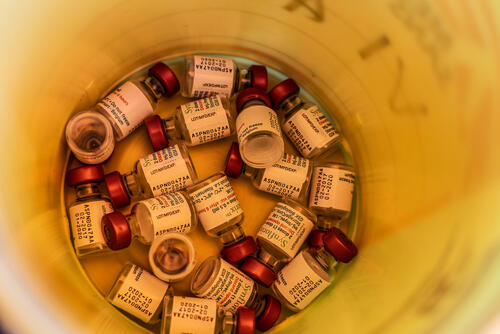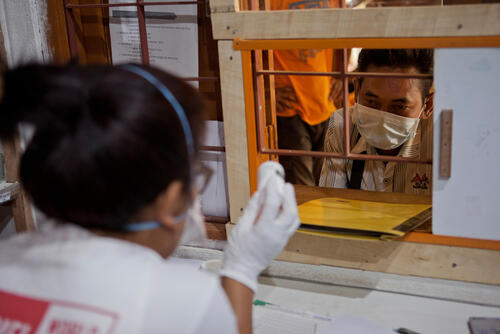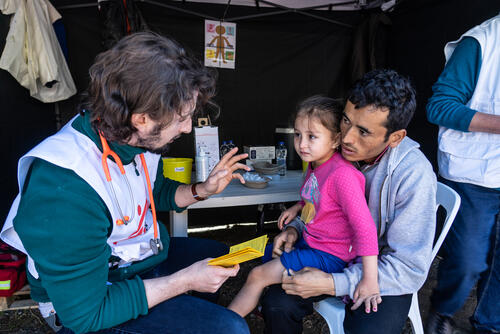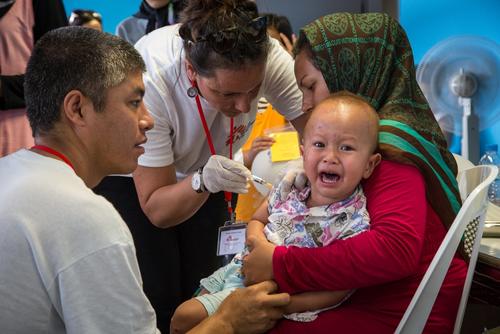- Millions of children around the world remain vulnerable to pneumonia – the leading cause of childhood death – because of exploitative pricing by Pfizer and GSK
- Nearly one-third of the world’s countries have been unable to introduce the vaccine, largely due to its high price
- More children could be protected if Gavi reserved its special funding for a new manufacturer offering a more affordable version of the pneumonia vaccine
Tokyo/Geneva –Médecins Sans Frontières (MSF) urges Gavi, the Vaccine Alliance to reserve its remaining funds for pneumonia vaccine under the Advanced Market Commitment (AMC) for a new manufacturer offering a more affordable version, and to stop awarding the funds to Pfizer and GlaxoSmithKline (GSK), which have already earned more than their fair share of the AMC subsidy, in addition to billions made from global sales.
“The current high price of the vaccine blocks kids from being protected against this childhood killer, and as doctors and nurses we have seen far too many children die due to pneumonia,” says Miriam Alia, vaccination and outbreak response expert for MSF.
Gavi is set to launch a call this week for its third replenishment to raise funds for its 2021-2025 programmes at the upcoming Tokyo International Conference on African Development (TICAD) in Yokohama, Japan. In calling for donor funding, Gavi should explore all ways to secure more affordable vaccines, including through promoting competition.
Pneumococcal conjugate vaccine (PCV), which protects children against pneumonia – the leading cause of childhood death – currently absorbs upwards of 40 per cent of Gavi’s total budget for 13 vaccines.
The AMC is a special financing mechanism set up in 2007 by Gavi and six donors (Italy, the United Kingdom, Canada, the Russian Federation, Norway, and the Bill & Melinda Gates Foundation) to stimulate development of versions of the PCV that meet developing-country needs and accelerate global rollout of this lifesaving vaccine. AMC donors pledged US$1.5 billion in a special subsidy fund that is used to top up the base price of the pneumonia vaccine paid to each company.
Pfizer and GSK, as the only two pharmaceutical corporations currently producing the vaccine, have long maintained a duopoly that allows them to keep pneumonia vaccine prices high. Gavi has been paying about US$9 per child for PCV with the additional subsidy awarded to the two corporations on top of this base price.
However, a third manufacturer – Serum Institute of India – recently announced that it will make PCV available at US$6 per child by the end of this year, presenting Gavi and its donors with a clear pathway to reach more children with the lifesaving vaccine.
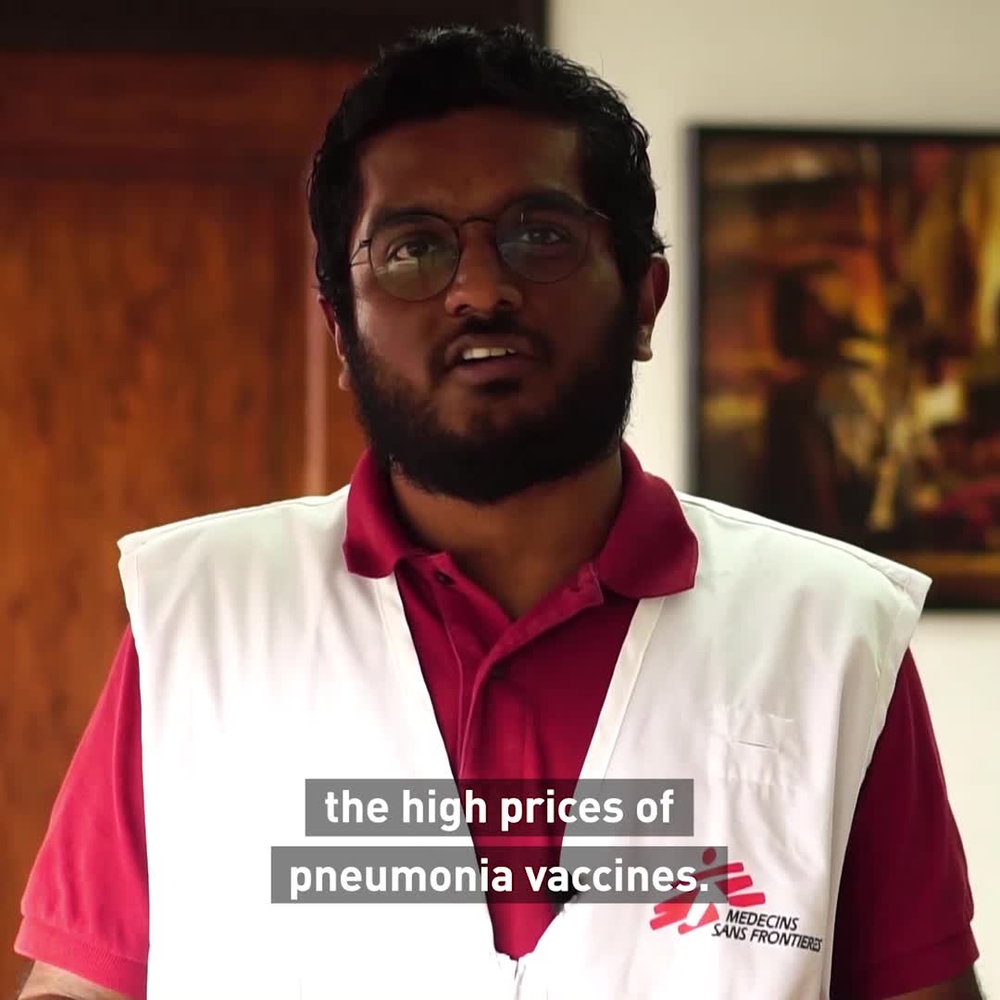
A message to Gavi: Help save more young lives by supporting more affordable pneumonia vaccines
What is the point of having such good vaccine when it remains unaffordable and out of reach to protect the kids against this devastating disease?Miriam Alia, vaccination and outbreak response expert for MSF
“Millions of kids around the world remain vulnerable to pneumonia because of exploitative pricing by Pfizer and GSK,” says Kate Elder, vaccines policy advisor at the MSF Access Campaign. “Gavi has already awarded hundreds of millions to these two corporations in special funding under the AMC mechanism.”
“With the expected entry of a new and more affordable pneumonia vaccine producer, Gavi now has a chance to stimulate real competition in the PCV market,” Elder continues. “We’re calling on Gavi to reserve the remaining AMC funds for new producers and to stop doling out subsidies to Pfizer and GSK, which have already reaped more than their fair share of the fund.”
The US$1.5 billion AMC fund was intended to help encourage competition among manufacturers to reduce the price of PCV. However, Pfizer and GSK alone have earned over US$1.2 billion of this fund, in addition to over US$4 billion in revenues from PCV sales to Gavi.
Just US$262.5 million remain in the AMC fund, which is currently scheduled to conclude at the end of 2020. MSF calls on Gavi to extend it beyond 2020 and to save the remaining funds for a new manufacturer offering a more affordable version of the pneumonia vaccine in the near future.
Having a third competitor will also offer a better chance of self-financing the vaccine for countries that have not introduced PCV in their programmes yet and to those that will lose Gavi support in the future. Switching to a more affordable version could potentially result in savings of up to US$1 billion for the organisation in the coming financial period.
“More competition in the pneumonia vaccine market is desperately needed so that countries can afford to protect their children. As Gavi launches its replenishment, it’s time to put an end to unnecessary funding that boost profits for multinational corporations when it could instead be held for a more affordable pneumonia vaccine. What is the point of having such good vaccine when it remains unaffordable and out of reach to protect the kids against this devastating disease?” Alia asks.
A more affordable pneumonia vaccine will result in Gavi being able to stretch its budget further, and it will help ensure the sustainability of national immunisation programmes in developing countries as they assume the costs themselvesKate Elder, vaccines policy advisor at the MSF Access Campaign
Globally, pneumonia causes more than a quarter of all deaths in children under the age of five – nearly one million young lives lost every year.
Pneumococcal infection and resulting deaths among children can be prevented with PCV. Yet, nearly one-third of the world’s countries have been unable to introduce the vaccine, largely due to its high price.
While 60 developing countries have introduced PCV in their routine immunisation programmes with Gavi support, the vaccine remains priced out of reach in many developing countries – particularly middle-income countries ineligible for Gavi funding.
“In today’s tight financial climate and with countries transitioning away from Gavi’s financial support, we need to use our dollars as smartly as possible. A more affordable pneumonia vaccine will result in Gavi being able to stretch its budget further as it goes into its replenishment year, and in the longer term it will help ensure continued sustainability of national immunisation programmes in all developing countries as they assume the financial costs themselves,” says Elder.



